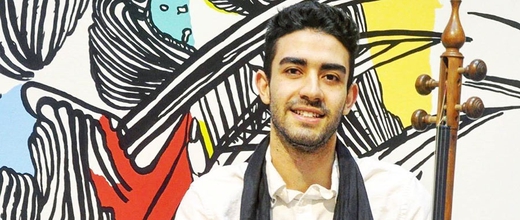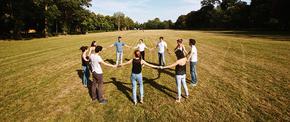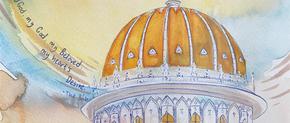The views expressed in our content reflect individual perspectives and do not represent the authoritative views of the Baha'i Faith.
I grew up in Nashville, Tennessee, a city famous for its country music, fried chicken and Southern hospitality. However, the city I am familiar with has much more to offer than what’s on the surface.
The Nashville I grew up in is home to one of the country’s most diverse music scenes and is a hub for refugees and immigrants from all over the world. It is truly both an international city and a musical city—two realities that are inextricably linked in this city. Our Baha’i Center was constantly frequented by people of all ages who had relocated to the United States. For example, it wasn’t unusual for Chinese dancers or West African drummers to perform at the Center.
As a teenager, Farzin Dehghan moved to Nashville from Iran, with dreams of becoming a professional soccer player. Now, at 22, he doesn’t play much soccer anymore, but is pursuing instead a musical career and is currently enrolled as a student at Berklee College of Music. He plays classical Persian music on the daf and kamancheh, two traditional Persian instruments. His craft has already enabled him to travel the world, from New York to Beijing.
Farzin and I first crossed paths when he moved to Nashville, when we were both 16. I’ve had the joy of watching his personal and musical journey. Watching Farzin play music is so captivating—there is no room to doubt his passion for music. I caught up with him before a Naw-Ruz performance at the Boston Museum of Fine Arts. Naw-Ruz is a holiday celebrated by people from many backgrounds, ethnicities, and religious groups. “New day” is the English translation of “naw-ruz” and it always falls on the first day of spring in the Northern Hemisphere. For Baha’is, Naw-Ruz marks the beginning of the Baha’i calendar’s new year and is considered a holy day. Before his performance, Farzin and I got to talk about his experience as a Baha’i musician.
[Maya] How did you become a Baha’i? Why are you a Baha’i?
[Farzin] I was born into a Baha’i family, and at age 15, the age of maturity in the Baha’i Faith, I declared my decision to be a Baha’i. I grew up in Iran where the majority religion is Shia Islam, and this religion is taught to children, in school, from 1st to 12th grade. I learned a little about Christianity once I came to the United States, when I was 16. I was always interested to learn what other religions believe because I believe that all faiths are essentially saying the same thing, only with little updates added with each new faith.
Baha’u’llah taught that we can all love everyone, regardless of their religion. It is the duty of Baha’is, to love everyone. He spoke about inclusiveness and bringing people together—about being the kind of person anyone can come to if they’ve got a problem.
[Maya] Why would you say you’re a Baha’i today?
[Farzin] I will always say I’m a Baha’i even if I fail to follow some of the Baha’i laws. I think the ideas of the oneness of mankind, the equality of men and women, and the harmony of science and religion just made more and more sense to me, as I got older. These three core principles are really important to me. I think they’re necessary to bring about the revolutionary kind of change Baha’u’llah spoke of—a change to a society where we realize we’re all the same.
[Maya] When, why, and how did you start making music?
[Farzin] My older brother, Afshar, was a music teacher at a little school in our area. I went with him to his school and I thought “I want to teach too.” Later, I passed a music store and saw an instrument being played and thought “Wow! What is this?” It was a daf, and the small size of the room produced a strong echo effect, which really resonated with me at that moment. So I started learning how to play the daf. After 1 month, I started teaching myself.
Then, I started to learn how to play the kamanche. When we came to Turkey about six months after that, I discovered YouTube and Google. I started searching my favorite artists and I would see that they had 20 albums out already. So I began transcribing songs I found on the computer, and then I would play them over and over and over again.
When I got to the U.S., two of my friends surprised me by taking me to a concert put on by one of my idols, Kayhan Kalhor. We drove 10 hours to North Carolina to see him. I met with Kayhan after the concert and I was shaking, so stressed out, but he listened to my music and he encouraged me. He told me to email him videos of my progress, and that he would help me. So, I did that, for two or three years.
Then, I started college at Berklee College of Music in Boston. I started to learn fundamental, academic music. I began to understand music in a broader perspective and learned how to explain theories. I gained the confidence to create my own music, and make my own sound. Two years ago, at age 20, I started to make decisions about how I wanted my music to sound. Today, I’m still exploring this. Trying to figure out what kind of sound you want to make with your instrument is like a lifetime research project on yourself.
[Maya] Do you feel like being a Baha’i affects the way you make music and the kind of music you make?
[Farzin] Definitely. I like to refer to this quote by Baha’u’llah:
We have made it lawful for you to listen to music and singing. Take heed, however, lest listening thereto should cause you to overstep the bounds of propriety and dignity. Let your joy be the joy born of My Most Great Name, a Name that bringeth rapture to the heart, and filleth with ecstasy the minds of all who have drawn nigh unto God. We, verily, have made music as a ladder for your souls, a means whereby they may be lifted up unto the realm on high; make it not, therefore, as wings to self and passion. Truly, We are loath to see you numbered with the foolish. – Baha’u’llah, The Most Holy Book, p. 38.
This quote really resonated with me because every time I played music, I could see that my soul was going up a ladder, and music was the tool that I was using to go higher and higher. So that quote makes a lot of sense to me. There are other quotes that talk about how music is a divine art and how every child must be given the chance to learn the arts in school. The fact that these perspectives come from someone who is a religious leader is revolutionary to me. It’s extraordinary.
[Maya] How does knowing about the divine aspect of music affect your career?
[Farzin] Sometimes, I chose to play or not to play with certain people, based on moral principles.
[Maya] So it affects the type of opportunities you take?
[Farzin] Yes, exactly.
[Maya] How do you face the challenge of making those kinds of choices?
[Farzin] The question I ask myself is: what would I prefer to be doing right now? For example, I’m good at math, would I rather be doing math formulas right now? I love soccer, but would I rather be running around right now? No, I’d rather be doing music.
[Maya] Do other musicians question your identity as a Baha’i?
[Farzin] I’ve experienced other people questioning me and my faith, but it doesn’t bother me; I see it as a positive experience. In some cases, it caused me to learn more about what I believe. That’s how consciousness grows. We’re supposed to seek out the truth, and exploring questions can help us get there.
Unfortunately there’s a stigma in even bringing up the subject of religion. I think this is even more true in the North [of the United States, than in the South]. I feel comfortable talking about religion, but I don’t try to enforce it. I don’t want to push it on people.
[Maya] What do you want people to take away from your music?
[Farzin] It disappoints me when I see people who view music as solely entertainment. That’s when I go to the Baha’i writings about what the arts actually are, what their true purpose is, and how we should treat them and think about them. The quote I shared earlier from Baha’u’llah says that we should be careful not to bring music down in a way that it’s not supposed to be used for. It is better for music to be used in a dignified way.
My sole purpose for creating music and art is to aspire to change somebody’s heart when they hear my music. That’s my ultimate goal. If I play in a concert hall filled with 2,500 people, as long as I have touched one person in the audience deeply, I’m satisfied.

















Comments
Sign in or create an account
Continue with Facebookor